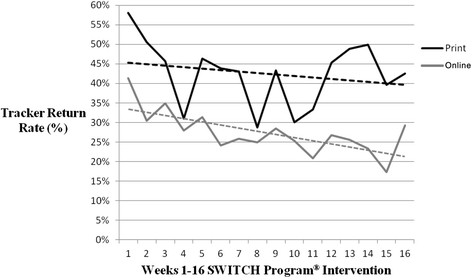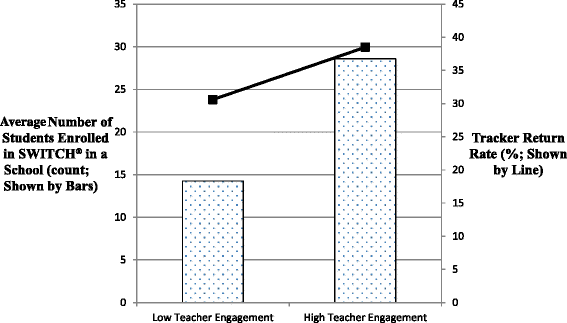A formative evaluation of the SWITCH® obesity prevention program: print versus online programming
- PMID: 26217535
- PMCID: PMC4511247
- DOI: 10.1186/s40608-015-0049-1
A formative evaluation of the SWITCH® obesity prevention program: print versus online programming
Abstract
Background: SWITCH® is an evidence-based childhood obesity prevention program that works through schools to impact parenting practices. The present study was designed as a formative evaluation to test whether an online version of SWITCH® would work equivalently as the established print version.
Methods: Ten elementary schools were matched by socio-economic status and randomly assigned to receive either the print (n = 5) or online (n = 5) version. A total of 211 children from 22, 3(rd) grade classrooms were guided through the 4 month program by a team of program leaders working in cooperation with the classroom teachers. Children were tasked with completing weekly SWITCH® Trackers with their parents to monitor goal setting efforts in showing positive Do (≥60 minutes of moderate-to-vigorous physical activity), View (≤2 hours of screen time), and Chew (≥5 servings of fruits and vegetables) behaviors on each day. A total of 91 parents completed a brief survey to assess project-specific interactions with their child and the impact on their behaviors.
Results: The majority of parents (93.2%) reported satisfactory experiences with either the online or print SWITCH® program. The return rate for the SWITCH® Trackers was higher (42.5% ± 11%) from the print schools compared to the online schools (27.4% ± 10.9%). District program managers rated the level of teacher engagement in regards to program facilitation and the results showed a higher Trackers return rate in the highly engaged schools (38.5% ± 13.3%) than the lowly engaged schools (28.6 ± 11.9%). No significant differences were observed in parent/child interactions or reported behavior change (ps > .05) suggesting the equivalence in intervention effect for print and online versions of the SWITCH® program.
Conclusions: The findings support the utility of the online SWITCH® platform but school-based modules are needed to facilitate broader school engagement by classroom teachers and PE teachers.
Keywords: Behavior; Childhood obesity; Intervention; School health.
Figures


References
-
- Obesity and overweight [http://www.who.int/mediacentre/factsheets/fs311/en/]
-
- Kriemler S, Meyer U, Martin E, van Sluijs EMF, Andersen LB, Martin BW. Effect of school-based interventions on physical activity and fitness in children and adolescents: a review of reviews and systematic update. Br J Sports Med. 2011;45(11):923–30. doi: 10.1136/bjsports-2011-090186. - DOI - PMC - PubMed
-
- U.S. Department of Health and Human Services. Physical Activity Guidelines for Americans Midcourse Report Subcommittee of the President’s Council on Fitness, Sports & Nutrition. Physical Activity Guidelines for Americans Midcourse Report: Strategies to Increase Physical Activity In. Edited by Services USDoHaH. Washington, DC; 2012.
LinkOut - more resources
Full Text Sources
Other Literature Sources
Miscellaneous

